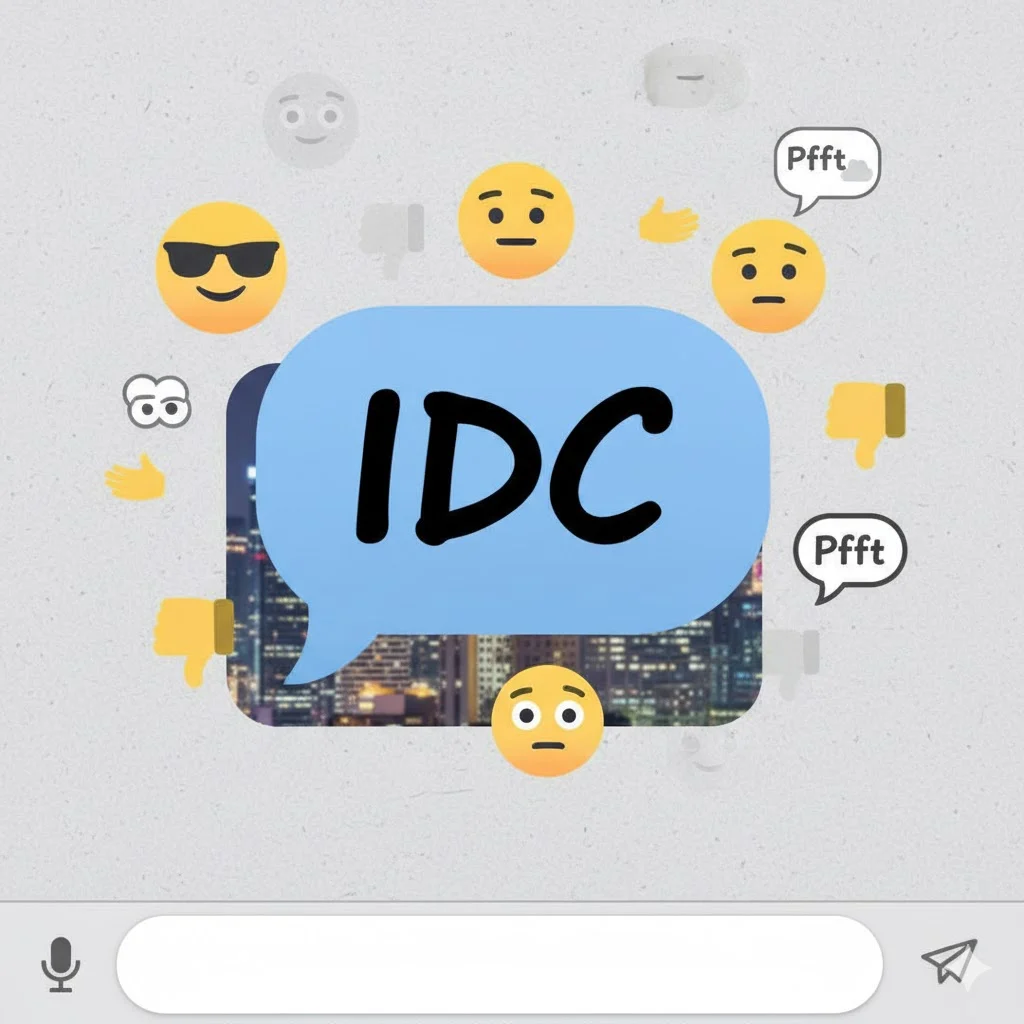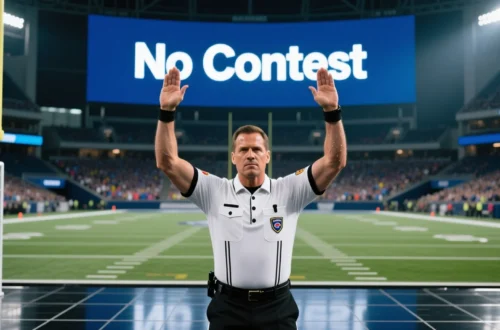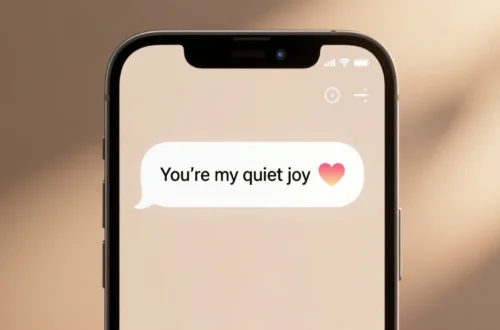Have you ever been texting a friend, scrolling social media, or chatting online and spotted “IDC” in a message? If you paused and thought, “Hmm… what does that mean?” — you’re not alone.
Whether you’re a casual texter, gamer, or social media enthusiast, understanding IDC is key to keeping up with modern texting lingo. Using it correctly can help you sound more natural in conversations, while misunderstanding it might lead to confusion or awkward replies.
This article is written specifically for you — the digital communicator. We’ll break down what IDC stands for, how it’s used, examples in real conversations, common misconceptions, and even tips for responding — all in plain, easy-to-read language. By the end, you’ll know exactly how to handle IDC in any text-based situation.
Definition & Meaning
IDC is an abbreviation for “I don’t care.”
It’s one of the most widely used acronyms in texting, social media, and online chat. It’s quick, informal, and conveys a lack of concern or interest about something someone else has said.
Examples in Real Conversations
Friend 1: “Do you want to watch that new horror movie tonight?”
Friend 2: “IDC, you pick.”
Teammate: “We lost again because of your move.”
Gamer: “IDC, I had fun anyway.”
Sibling: “You should clean your room first!”
You: “IDC, I’ll do it later.”
In each example, IDC signals that the person is unbothered or neutral — either politely, casually, or even playfully.
Background & History
IDC comes from early internet and SMS culture. As people started texting on phones with limited character space, abbreviations became essential.
- I don’t care → IDC
- I’m just kidding → IJK
- Laughing out loud → LOL
IDC quickly became a staple in chat apps, social media comments, and forums because it’s short, easy to type, and conveys emotion without extra words.
While the tone is generally neutral, context matters. Among friends, it might be playful or joking. In heated conversations, it can come across as dismissive or rude.
Usage in Various Contexts
IDC can fit into many digital communication settings. Let’s break it down:
1. Texting & Casual Chats
Friend: “Do you care if we go to the park or stay home?”
You: “IDC, whatever you want 😄”
Here, IDC is neutral — showing flexibility and lack of strong opinion.
2. Social Media & Comments
“IDC if people disagree with me, I love this movie!”
“IDC, this meme is hilarious 😂”
Social media users often use IDC to show independence or indifference to others’ opinions.
3. Gaming / Online Communities
Player1: “We lost again, thanks to your strategy!”
Player2: “IDC, at least I got the kill 😎”
Gamers use IDC to brush off criticism, sometimes humorously.
4. Casual Spoken Conversation
Though more common in text, some people might say “I don’t care” verbally. It’s rarely spoken as “IDC,” but in informal voice chats, the idea is the same.
Common Misconceptions & Clarifications
❌ Misconception 1: IDC is Always Rude
Not always. Tone and context matter.
- Playful: “IDC, you choose the restaurant 😆”
- Dismissive: “IDC, do whatever.”
❌ Misconception 2: IDC Means “Ignore Directly Comment”
Nope. In texting, IDC exclusively means “I don’t care.”
✅ Truth: IDC Reflects Neutrality or Indifference
Use it carefully. Among friends, it’s casual and safe. In professional or formal chats, it can appear disengaged or rude.
Similar Terms & Alternatives
| Term / Slang | Meaning / Use | Tone |
|---|---|---|
| IDC | I don’t care | Casual, neutral |
| IDGAF | I don’t give a f*** | Strong, rude |
| Meh | Indifference | Mild, playful |
| Doesn’t matter | Neutral | Safe, polite |
| Whatever | Indifferent | Casual |
Choosing the right alternative depends on your tone, audience, and context.
How to Respond to IDC
Your response can match the tone or redirect the conversation.
1. Casual / Friendly
Friend: “IDC what game we play.”
You: “Cool, let’s try that new one then 😄”
2. Funny / Playful
Friend: “IDC if I eat all the snacks.”
You: “Then I guess I’ll starve 😂”
3. Curious / Clarifying
Friend: “IDC about the party.”
You: “Really? You don’t mind at all?”
4. Professional / Polite
In formal communication, avoid IDC. Instead:
“I’m flexible — whatever works best.”
“I’m fine with either option.”
5. Privacy-Conscious / Safe
“Understood, I’ll handle it.”
“Noted, I’ll follow your lead.”
Regional or Cultural Differences
IDC is widely used in English-speaking countries — especially online.
- In the U.S., U.K., Canada, and Australia, IDC is instantly understood.
- In non-English-speaking countries, people may not know IDC unless they’re familiar with English texting culture.
- IDC is generally neutral, unlike stronger acronyms such as IDGAF.
Comparison with Similar Terms
| Expression | Meaning | Intensity | Formality |
|---|---|---|---|
| IDC | I don’t care | Mild | Informal |
| IDGAF | Strong disregard | High | Informal / Rude |
| Meh | Mild indifference | Low | Informal / Playful |
| Doesn’t matter | Neutral | Mild | Safe / Polite |
| Whatever | Casual | Moderate | Informal |
IDC is perfect for quick text reactions, while “doesn’t matter” or “whatever” can soften the tone in more sensitive conversations.
Usage in Online Communities & Dating Apps
- Twitter / X: “IDC what they say, I’m watching it anyway 😎”
- Instagram: “IDC if this meme gets dislikes, it’s hilarious 😂”
- Tinder / Dating Apps: “IDC where we meet, as long as it’s fun 😏”
- Gaming: “IDC if we lose, this strategy is too fun!”
Tips for using IDC online:
- Pair with emojis to clarify tone.
- Avoid overuse — it can make you seem disengaged.
- Be careful in professional forums or discussions.
Hidden or Offensive Meanings
IDC is generally neutral, but can seem dismissive if used in the wrong context.
- Playful / casual: “IDC, let’s go!”
- Rude / harsh: “IDC, do whatever.”
Tone, punctuation, and context are everything. Adding emojis often softens the message.
Suitability for Professional Communication
IDC is not recommended in professional or formal settings.
Instead, use polite alternatives:
- “I’m flexible.”
- “Either option works for me.”
- “I have no preference.”
Using IDC in work emails, Slack channels, or formal group chats can make you seem disengaged or unprofessional.
FAQs
1. What does IDC stand for?
“I don’t care.”
2. Is IDC rude?
It can be, depending on tone and context. Among friends, it’s casual. In formal settings, avoid it.
3. Can non-English speakers understand IDC?
Not always — familiarity with English texting culture helps.
4. What’s a stronger version of IDC?
IDGAF — but that’s more explicit and can be offensive.
5. Can I use IDC in voice chats?
Technically yes, but it’s usually spoken as “I don’t care.”
6. Are there emojis that pair well with IDC?
😎, 😏, 🙄 — emojis help show your attitude or tone.
7. Is IDC positive or negative?
It depends — it’s mostly neutral but can seem dismissive if overused.
Conclusion
IDC is short, simple, and everywhere in modern texting. It stands for “I don’t care” and is useful for expressing neutrality, indifference, or casual disregard in informal conversations.
Use it with friends, social media contacts, or in gaming chats. Avoid it in professional or formal contexts, where polite alternatives work best.
With this guide, you’ll now instantly recognize IDC, understand the tone behind it, and know how to respond naturally.






